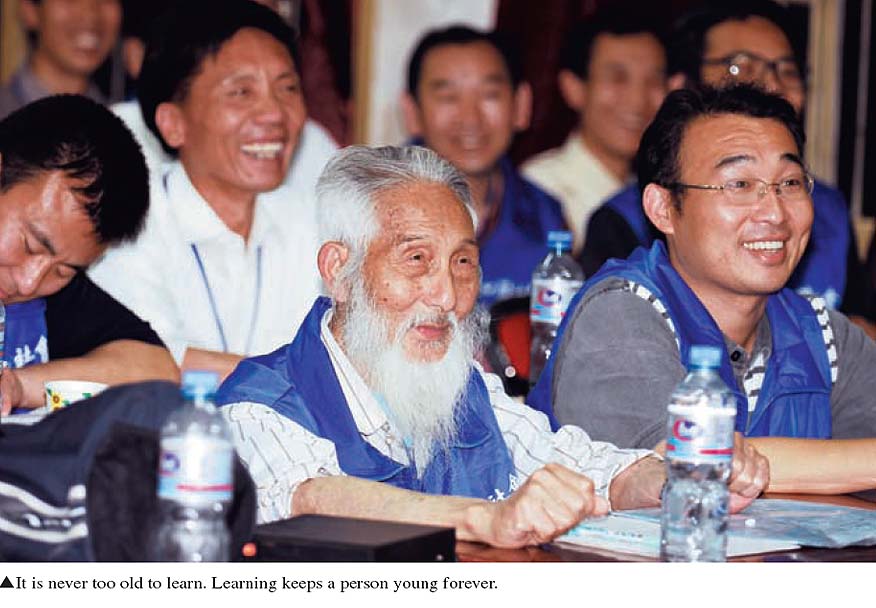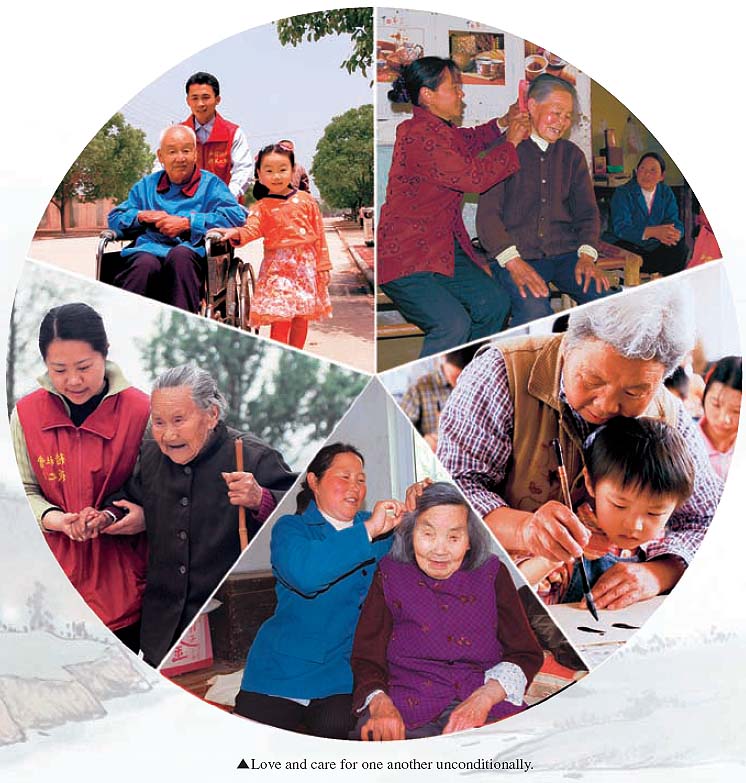The Welfare of the Senior Citizens
A Concept for the Establishment of Garden Villas for the Elderly
by Professor Chin Kung, July 2007

I left Taiwan in the 1970s, and have been traveling to various countries and regions to teach Buddhist principles based on what is taught in the Sutras. Everywhere I went, I wanted to find out two things: Firstly, the welfare of the elderly and secondly, the youth crime rate.
Why do I want to find out the welfare of the elderly? As we know, the ageing population is a world problem. How to take care of the livelihood of the senior citizens is a major concern of most governments. The traditional concept of “Rearing children to provide for the old age” is a wishful thinking and is not practical now. Not that the younger generations are not filial but that they lack the ability to take care of them. Nursing homes for the elderly seems to be the only solution in some countries.
Examining the social structure in different countries, we find that not many countries have facilities for the elderly. However, such facilities are found in countries like the USA and Australia, especially in Australia. The government there does look after their senior citizens. But, be it the state-owned or privately-run, the services provided focuses on the material needs of the elderly and not the spiritual aspirations. The workers involved only provide devices prescribed by the regulations. True love and compassion are not always shown. The elderly would soon feel depressed and lonely. They would live in solitude and some would simply count their final days.
As a consequence of our recent studies from the Flower Adornment Sutra (the Avatamsaka Sutra), we are, again, inspired by the concept of“The Four Immeasurable Compassions” that we have a duty to look after the elderly. We hope that all could pull resources together to help the elderly. The elderly, our senior citizens, have made tremendous contribution to the society in the past. Now, they should be entitled to enjoy their lives. We should build a selfless cordial society.
Here are some thoughts of mine.
1. Facilities and services similar to what is found in 5-star hotels should be made available to the elderly. The accommodation provided should be comfortable with scenic views. Daily room services should be made available. Construction cost can be met by preselling the rooms. Once construction is finished, these rooms could be for sell or rent. Rooms not in use could be leased out. These could be made available to the guests of the residents, or students who may need to make use of such facilities for study during their vacation.
2. A number of dinning facilities should be in place to provide buffets throughout the day. The food served will meet the religious requirements as well as dining habits.
3. We should be careful not to use terms like“nursing home for the elderly” as it will be a constant reminder of the old age of the
residents. Instead, we should use names such as villa, country cottage or cabin. For example, Mount Cook Villa can be the name for a villa at the foot of Mount Cook. The villas can serve as a university for the elderly, a multi-cultural education center, an institution for moral education, Art Museum or multi-purpose complex for other usage.
4. Hospitals will be established close by and so will primary schools and kindergartens. Both the elderly and the children of tender age are served by the staff with love and compassion. The very fact that these two groups of residents will live together in harmony will help to reinforce love, and the need to extend our love and affection to the aged.
5. Members of the staff who render service within the complex, whether they work at the clinic, in primary schools or nursery schools will be well acquainted with prescribed textbooks well referred to in Confucianism, Daoism and Buddhism, such as The Standards for Being a Good Student and Child, Accounts of Request and Response, Ten Virtuous Conducts Sutra. The importance of filial piety and respect for the elders must be upheld. They should show respect to the elderly when serving them and they should have the attitude of truthfulness and loving kindness similar to what their children would have adopted. The pilot program of promoting the The Standards for Being a Good Student and Child at the Lujiang Centre of Cultural Education in Tang Chi County, An Hui Province in China is a very good example. The success of the program has received high compliments at the UNESCO Headquarters in Paris in October 2006. It is possible to adopt the teaching model offered at the Lujiang Centre of Cultural Education and to draw inspiration from it.
6. The senior citizens with different faith or religious affiliation will live with one another in the same areas. The complex will provide facilities for interfaith and cultural activity. For example, there shall be chapels, mosques, as well as temples. Different types of religious gatherings will be organized. Multi-media facilities will be available to show different religious images to suit different gatherings. Multicultural activities and programs will be made available at weekends and during the holiday seasons.
We must bear in mind the interests of the senior citizens. Our purpose is to enrich their spiritual lives. The programs we would offer must include topics to reflect humanity, morality, philosophy, wisdom and scientific principles. These will enable the elderly to appreciate the meaning of life and elevate their spirituality.
7. There may be some senior citizens who would want to impart their special skills to the younger generations. They will have the opportunity to do so as volunteers. Members of the younger generation would be invited to these workshops and would benefit from what the elders have to teach. The teachings, as well as the happy life of the senior residents, could be documented and made available to the general public.
8. After the completion of this complex for the elderly, we should invite representatives from different countries and from the UNESCO/United Nations to visit and explore our experiences. We hope this should inspire them to render similar services in their own countries. Multinational corporations could be forged to consider setting up similar franchise villas in different parts of the world. It is very likely that they would receive support from many governments, because they will be in a position to help solving a social problem, and they could help to reduce the burden in looking after the elderly.
9. Many traditional heritages of different cultures are being marginalized. In many instances, it is the senior citizens who are preserving them. They are the ones who know how to appreciate the treasures of culture. We should invite senior citizens who possess these kind of skills to come forward and demonstrate these heritages. All will benefit from such a meaningful endeavor.
We all have parents. We will all get old, too.
Mencius said:“We provide for our own parents and we should extend our magnitude and provide for parents of all. We provide for our children and we should extend our magnitude and provide for children of all.” Should we be able to do this, we should be able to do anything easily.
The elderly have dedicated the whole of their life in the service of their country and their community. It is about time they enjoy the respect they deserve from the younger generation. If we could truly adopt an attitude of appreciation and extend our filial piety to all the elderly; if we could create a paradise for them, truly provide them with first class accommodation, and fulfill our duty in looking after them; if we could unify different religious groupings and people from different ethnic origins; if we could magnify the significance of traditional culture and promote the education for filial piety and universal love, then everybody around the globe would appreciate and support our effort and a harmonious world is not far away.

|
